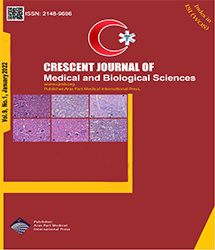
| Original Article | |
| Efficacy of Oral Propranolol on the Treatment of Retinopathy of Prematurity | |
| Mina Hosseini1, Manijeh Mostafa Gharebaghi1, Masood Bagheri2,3, Sadollah Yeganehdoost1, Amir Eftekhari Milani3, Mohamad Reza Niyousha3 | |
| 1Alzahra Hospital, Children Medical Research and Training Hospital, Tabriz University of Medical Sciences, Tabriz, Iran 2Department of Ophthalmology, Imam Khomeini Eye Center, Kermanshah University of Medical Sciences, Kermanshah, Iran 3Department of Ophthalmology, Nikookari Eye Center, Tabriz University of Medical Sciences, Tabriz, Iran |
|
|
CJMB 2022; 9: 056-062 DOI: 10.34172/cjmb.2022.10 Viewed : 4446 times Downloaded : 4154 times. Keywords : Propranolol, Avastin, Laser therapy, Retinopathy of prematurity |
|
| Full Text(PDF) | Related Articles | |
| Abstract | |
Objectives: Due to recent advances in caring for premature neonates, premature retinopathy has become an important cause of preventable blindness and ocular disabilities. Therefore, more attention is paying to its diagnostic-therapeutic methods. Thus, the current trial assessed the efficacy of oral propranolol on the treatment of retinopathy of prematurity (ROP) in neonates. Materials and Methods: In the current trial, 58 neonates with ROP were included and the efficacy of oral propranolol (0.5 mg/kg every 8 hours) was compared with the control group. Results: In the intervention group, the stage of ROP was almost the same as the control group while 31.1% of neonates in the control group were progressed to stage 3. On the other hand, it was only 6.9% (P = 0.009) in the intervention group. In patients receiving propranolol, only 2 cases required invasive therapeutic interventions whereas 9 patients required such interventions in the control group (P = 0.009). The ROP improvement rate was significantly higher in the intervention group. In the control group, the overall progression to higher stages was about 48.3% while it was 13.8% for the intervention group. The mean age of neonates at the time of retinal artery completion was 91.40 ± 22.16 and 128.08 ± 79.89 days for the control and intervention groups, respectively (P = 0.136). Conclusions: The results of this study showed that adding oral propranolol to standard therapy can reduce the rate of ROP progression to higher stages in preterm neonates with low birth weight, and the need for invasive treatments. |
Cite By, Google Scholar
Google Scholar
PubMed
Online Submission System
 CJMB ENDNOTE ® Style
CJMB ENDNOTE ® Style
 Tutorials
Tutorials
 Publication Charge
Medical and Biological Research Center
About Journal
Publication Charge
Medical and Biological Research Center
About Journal
Aras Part Medical International Press Editor-in-Chief
Arash Khaki
Deputy Editor
Zafer Akan


















